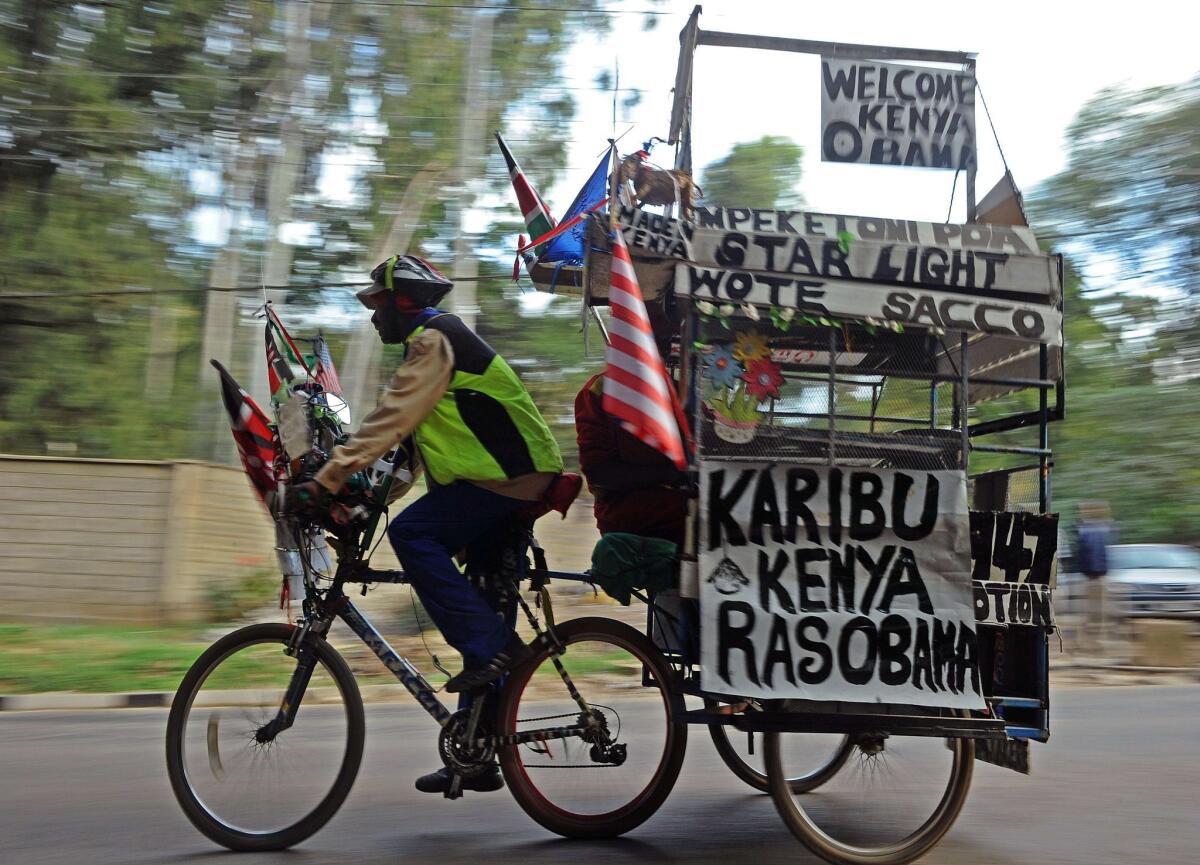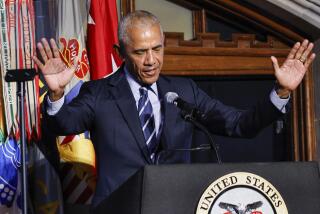Kenyans have sky-high hopes for Obama’s visit to his father’s homeland

An man on a bicycle pulls a trailer with messages welcoming President Obama to Kenya in Nairobi on Thursday.
- Share via
reporting from nairobi, kenya — On a roadside, women bent double planting new grass, just a few blades at a time, into newly dumped red earth. With President Obama due in Kenya’s capital on Friday, feverish last-minute preparations were underway — and expectations were soaring.
“We are sure that when Obama comes we are going to have various new ideas and we are going to have changes in our country so we can go far and we can become a developing country like other ones,” said Sammy Kioko, 27, a worker on one of the street-landscaping projects preparing for Obama’s visit.
The president flies into Nairobi airport late Friday, is staying two nights in the country and flies out Sunday for Addis Ababa, the Ethiopian capital and seat of the African Union. Seen by many Kenyans as “our son” because his father was Kenyan, expectations of Obama’s trip are monumental. But disappointment seems all but certain.
There is heady talk that Obama will bring a hefty economic package, while others extol his trip as salvation for the country’s struggling tourist industry, choked by insecurity and recent terrorist attacks on the coast and in northern Kenya.
President Uhuru Kenyatta promised his countrymen that Obama’s visit would bring “deals that will improve our economy.”
During the whirlwind visit, Obama will hold talks with Kenyatta and other government officials, cohost the Global Entrepreneurship Summit, attend a state dinner, address a group of 5,000 invited Kenyans at Kasarani Stadium gymnasium, including people with disabilities, elders and representatives of youth and women, and will visit Kenyatta University.
SIGN UP for the free Today’s Headlines newsletter >>
But much of the focus here has been on what Obama is not planning to do.
Students at the University of Nairobi wrote a letter demanding the president visit their campus, warning that 18 students were ready to commit suicide if he did not, while others were ready take out their wrath on a tree he planted at the university when he visited as a senator in 2006.
“Thirty-one female students have threatened to urinate on the tree Obama planted should he fail to visit the university. Male students could do worse,” the letter said.
And locals in Obama’s ancestral village, Kogelo, were shocked when U.S. Ambassador Robert F. Godec announced last week that the president wouldn’t be visiting the settlement where his father’s grave lies — a huge omission in local culture, where paying homage to deceased ancestors is paramount.
His step-grandmother, Sarah Obama, who hoped that he would spend a night in the village, promised to slaughter a chicken, duck, sheep or cow in his honor, depending on what he wanted to eat.
In a small, cluttered workshop in the sprawling slum neighborhood of Kibera, printer Mark Madegwa applied thick paint to a screen, printing his home-designed T-shirts to sell to locals for $5 apiece.
“I’m using very bright colors, because people like bright colors,” he said. “I think Obama will see one of my T-shirts because people buying them will go to welcome him.”
Kibera, seen by some Kenyans as a dangerous, unpredictable place, is not on Obama’s schedule, although it was in 2006. Madegwa said he wishes the president would take the time to see how the poorest people scrape out a living, and how they cram their families into a single room with a curtain for a wall.
“If I could meet him, I’d request him to come to Kibera .... You know, here in Kibera we believe we are the people who live in poverty. We’re the poorest ones. In Kibera, we just survive.”
While Kenyans such as Madegwa yearned for Obama to visit, others were preparing to unroll the welcome mat if the president speaks out in favor of gay and lesbian rights, as he has done on previous trips to Africa.
Kenyatta said Tuesday that gay and lesbian rights was “a non-issue to the people of this country.” A conservative party threatened to stage an anti-homosexual rally in the streets of Nairobi on Wednesday, with 5,000 people marching naked in a stunt intended to demonstrate the differences between men and women, but it was canceled at the last minute.
Gay sex is illegal in Kenya, as in much of Africa.
A spokesman for the Kikuyu tribe’s council of elders, Samuel Thuita, said earlier this month that members of his tribe would pelt Obama with rotten eggs if he dared to raise the issue of homosexuality. State Department officials have said Obama won’t shy away from raising issues the United States sees as important.
Despite that sour note, the mood in Nairobi was primarily one of excitement over the visit, amid somewhat heavy-handed preparations. Flags and posters bearing the greeting “Karibu Kenya” (Welcome to Kenya) decked the capital.
In addition to sprucing up the city, authorities appeared to be rounding up and removing homeless people, although Nairobi’s government denied this — and also stretched credibility by denying that the street beautification had anything to do with Obama’s visit.
Despite those denials, witnesses told The Times that they saw homeless people being loaded onto trucks and moved out. Local television showed footage of people who had been relocated to a building in Kibera, and an official at the site quietly confirmed they had been brought there. He refused to give his name.
Newspaper seller Martin Owange, 37, said Kenya’s cleanup was like a rural African family gussying up the homestead for the arrival of a city visitor.
“If you ask any Kenyan who’s living in Nairobi, they know very well it was being done because Obama is coming,” he said. “Why do it only after hearing Obama is coming?”
With some of the newly planted palms already wilting, he didn’t think the landscaping would stay beautiful for very long after Obama’s departure.
“Kenyans have a habit, when something is completed, they just leave it. They forget about it,” he said.
The beautification sparked a Twitter hashtag #KideroGrass, named after Nairobi Gov. Evans Kidero, who tweeted a complaint that Kenyans “keep on stamping and killing” the grass, and begging people to keep off of it.
One photograph circulating on Twitter showed red earth and a few straggly blades of green, while some suggested spray painting it green.
“If you think your life is hard, remember there is grass in Nairobi being forced to grow in 3 days,” tweeted one blogger, Cyprian Nyakundi.
Follow @RobynDixon_LAT for news from Africa.
ALSO:
Warnings of war, charges of diplomatic failure fly at Iran hearing
Shoppers pour into reopened Kenyan mall 2 years after terrorist attack
President Obama again leaves Nigeria off his Africa trip itinerary
More to Read
Sign up for Essential California
The most important California stories and recommendations in your inbox every morning.
You may occasionally receive promotional content from the Los Angeles Times.












